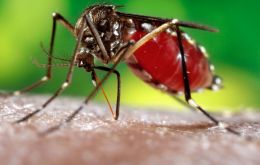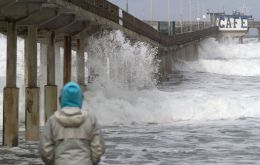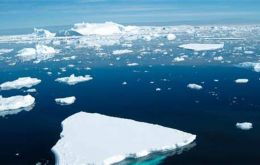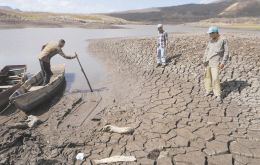MercoPress. South Atlantic News Agency
Tag: El Niño
-
Thursday, October 17th 2024 - 06:13 UTC
Panama Canal posts significant setback in FY2024

The Panama Canal Authority (ACP) reported this week a 29.3% drop in passing ships during Fiscal Year 2024 as a result of the severe drought affecting the interoceanic crossing. A total of 9,944 transits were recorded this year, a significant setback from 14,080 crossings in 2023. A fiscal year runs from October 1 to September 30 of the following year.
-
Friday, April 12th 2024 - 22:20 UTC
Brazil accounts for nearly 70% of dengue cases in LatAm and Caribbean

According to a survey conducted by the Pan American Health Organization (PAHO), Brazil accounted for almost 70% of dengue cases in Latin America and the Caribbean, where some 4.6 million infections were confirmed this year, representing a 237% interannual increase, Agencia Brasil reported. PAHO is the arm of the World Health Organization (WHO) in the Americas.
-
Thursday, April 11th 2024 - 19:44 UTC
Rotating supply cuts launched as Bogotá's water reservoirs are running dry

Authorities in the capital of Colombia began rationing water on Thursday as local reservoirs were reported to be nearing alarming levels due to the El Niño phenomenon coupled with the aftermaths of global warming. It has not been ruled out that the severe drought might result as well in an energy crisis hitting some 10 million people who live in Bogotá and the surrounding areas.
-
Wednesday, November 1st 2023 - 14:32 UTC
Panama Canal further reduces ship crossings as more severe drought hits Lake Gatun

Higher shipping costs as the Panama Canal, one of the world’s main maritime trade routes, will further reduce daily ship crossings in the coming months due to a severe drought, the authorities managing the canal.
-
Monday, September 4th 2023 - 11:17 UTC
“El Niño” arrives in Argentina

Argentina's National Meteorological Service (SMN) issued a report stating that the El Niño phenomenon had arrived in the country after water temperatures in the Pacific Ocean remained above those considered normal, thus triggering an atmospheric response to the warming.
-
Sunday, August 27th 2023 - 00:09 UTC
Hot weather hits Rio de Janeiro this winter

Despite the southern hemisphere being still in winter, meteorologists foresee temperatures in the iconic city of Rio de Janeiro might reach 41°C as dry conditions heat up Southeastern Brazil, Agencia Brasil reported Thursday.
-
Friday, June 9th 2023 - 11:08 UTC
Onset of “El Niño” announced

The US Oceanic and Atmospheric Administration (NOAA) announced Thursday the onset of “El Niño,” a weather phenomenon characterized by a warming of the surface of the equatorial eastern Pacific Ocean that occurs every 2 to 7 years, which can increase the risk of heavy rains and droughts in some parts of the world and lead to record temperatures.
-
Wednesday, February 22nd 2023 - 08:03 UTC
El Niño to cause irreversible thawing in Antarctica, study finds

According to an investigation by the Australian Government's scientific agency (CSIRO), the “El Niño” phenomenon would cause an increase in underwater temperatures that would cause irreversible melting of the shelves and ice sheets, it was reported on Tuesday.
-
Monday, September 16th 2019 - 09:04 UTC
Borneo schools closed for a week because of dangerous air quality caused by forest fires

Schools in two cities in the Indonesian part of Borneo island will be closed for a week after smoke from forest fires caused air quality to hit “dangerous” levels, a local government official said on Sunday.
-
Tuesday, September 11th 2018 - 09:29 UTC
El Niño 2018/19 could be a repeat of 2015/16, cautions WMO

There's a 70% chance of a recurrence of the El Niño weather event before the end of this year, according to the World Meteorological Organization. The last El Niño occurred in 2015-16 and impacted weather patterns around the world, but researchers say they are not expecting this new one to be as intense as 2015-16.
